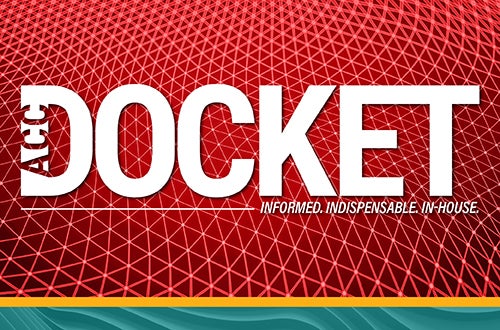Steven Walker, Fellow @The College of Law and Managing Director, Law Dept. and Contracts Consulting APAC @Elevate Services, shares his views on “Legal Dept. 2.0”.

Last month I had the pleasure of attending the Association of Corporate Counsel In-House Counsel Days in South Australia and Victoria to explore what a “Legal Dept. 2.0” might look like in a rapidly evolving legal sector.
I tend to think that next generation legal departments will pivot towards the business of delivering legal services rather than purely on the practice of law, blending legal talent with new capabilities and functional competencies to deliver end-to-end, holistic business solutions. In-house teams are perfectly positioned to embrace the increasing ‘processesification’ and ‘technologisation’ of legal services, using legal skills, business judgment and technology to enable better, faster, cheaper legal solutions for their clients. In doing so, legal departments will evolve from traditional roles of risk and compliance managers, and legal consultants, to strategic business assets and advisors for their clients. Excellent legal skills serve as the starting point for in-house lawyers to thrive in this new environment. New skills, tool and techniques must be acquired and put to work.
Speaking with in-house lawyers working inside public and private sector organisations across Victoria and South Australia, whether sole counsel or part of large legal teams (and everything in between), it is apparent that all face the same challenges of modernisation, optimisation and change, to respond to the challenges and take advantage of the opportunities of in-house legal delivery in 2019. Everyone is trying to solve broadly the same problems, just in different ways and prioritising different areas, depending on their unique situations. My top 3 takeaways from Melbourne and Adelaide (in the broadest brush strokes I can manage) are below.
- In-house lawyers typically face a ‘supply’ not a ‘demand’ problem. Clients appreciate the work of legal colleagues and desire more access and service, and greater involvement in both strategic and tactical business matters. This is a wonderful problem to have and one of the main reasons I became an in-house lawyer many years ago. It contrasts with the life of in-house counsel not too long ago, who were frequently perceived as independent compliance advisors to be consulted of necessity as late as possible. To meet the demand problem, in-house counsel must make deliberate decisions about where to play, and where not to play. Bandwidth must be liberated for the most complex and value-accretive work, meaning other activities must be right-sourced to the legal supply ecosystem, or to technology solutions (e.g. client self-service systems), or hybrids, or not performed at all. It is not a sustainable solution to simply continue to hire further lawyers, even if that were possible.
- None of this happens by accident and requires a legal department strategy aligned to enterprise strategy and objectives as well as legal department priorities. Lawyers excel in formulating complex strategies for our clients, but frequently forget them for our own ‘legal business’. The best strategies map essential building blocks over 1, 2 or even up to 5 years, such as business-value creation initiatives, efficiency and optimisation initiatives, talent acquisition, retention and development, knowledge management, use of metrics and the introduction of KPIs across core functions and services, alongside the required investments. A good strategy should also include a technology roadmap to define the journey for acquisition and deployment of LegalTech, including the “Core 4” of Enterprise Financial Management, Matter Management and Document Storage Systems, Contract Lifecycle Management and workflow automation with digital signatures. There are terrific ACC resources to help legal departments on their strategic planning journeys.
- Legal Department Operations is now a thing in Australia, playing catch-up to the US and UK. LDO assists law departments to run like a business, to drive operational excellence, resource and outcome optimisation and continuous improvement. The function is increasingly recognised as enabler for legal departments and comprises personnel working ‘on’ the business rather than just ‘in’ it, supporting strategic management of department inputs (people, technology, vendors, data, process, partners etc) and outputs. Departments large and small will be well-served in 2019 to plan for how they intend to deploy fundamental LDO capabilities (e.g. financial management, data analytics, process optimisation). If your department doesn’t have capacity to build LDO internally, beg, borrow or steal capability from elsewhere in your organisation or buy it from a supplier. Just start now.
It is truly an exhilarating time to be an in-house lawyer and ‘legalpreneur’. Now more than ever, the tools, technologies, ideas, support and services exist for legal departments to flourish and deliver peak client service. But that first requires a plan..

